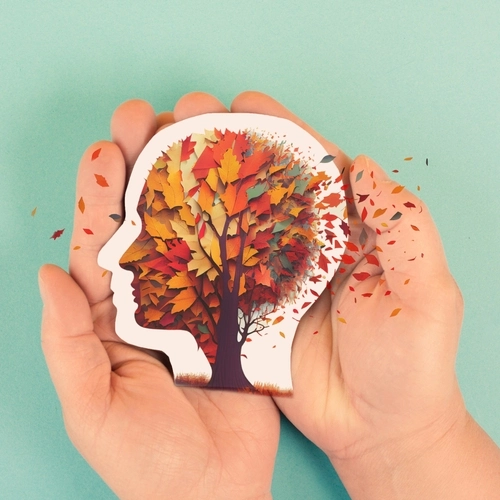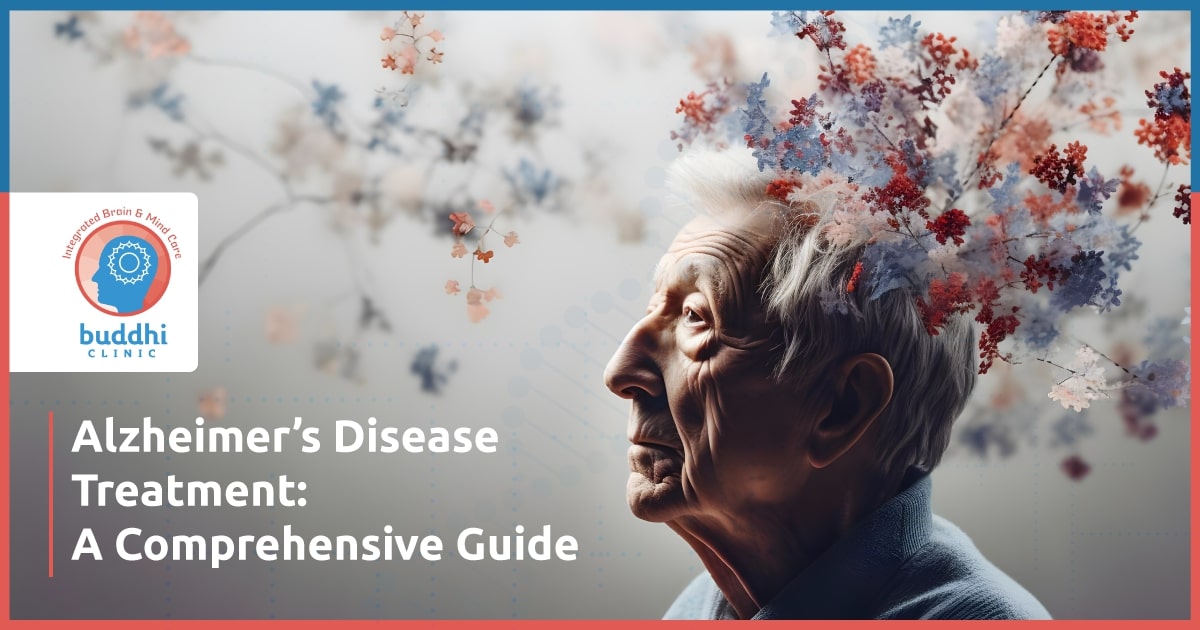Alzheimer’s disease is something many people are facing today, and it can really change how life works for those affected. It’s essential to talk about what Alzheimer’s is, how it impacts individuals and families, and the available Alzheimer’s disease treatment options that can help improve quality of life.
Understanding Alzheimer’s Disease
At its core, Alzheimer’s is a type of dementia that impacts memory, thinking, and behaviour. As the disease advances, everyday tasks can become more difficult, and communication may also become challenging. Around 55 million people worldwide are living with dementia, and Alzheimer’s disease is the most common form, contributing to 60–70% of cases, according to the World Health Organization.

Another study highlights the growing urgency of the situation: every three seconds, someone develops dementia. Projections indicate that the number of individuals affected will nearly double every 20 years. By 2030, it’s anticipated that 78 million people will be living with dementia, with that figure potentially rising to 139 million by 2050.
| Did You Know?Dementia is a general term for problems with thinking and memory. Alzheimer’s disease is a specific kind of dementia that affects the brain in certain ways. So, while everyone with Alzheimer’s has dementia, not everyone with dementia has Alzheimer’s. |
But it’s not just the person with Alzheimer’s who feels the effects; families and friends feel it, too. Caregivers often experience stress and emotional strain while looking after someone with this condition. By spreading awareness and sharing information like Alzheimer’s disease treatment options, we can create a better support network for everyone involved.
What is Alzheimer’s Disease?
So, what exactly is Alzheimer’s disease, and what happens in the brain? Alzheimer’s disrupts memory and cognitive abilities, leading to changes that damage brain cells. Early on, people might forget small things like where they put their keys, but as time goes on, they can struggle with finding the right words or get confused in familiar places.
What causes Alzheimer’s Disease?
Researchers are still trying to pinpoint the exact causes of Alzheimer’s, but it seems to come from a mix of genetics, environment, and lifestyle choices. Age is a big factor; most people diagnosed are over 65. If someone has a family history of Alzheimer’s, their risk goes up. Other health issues related to blood vessels, like heart disease, might also play a part, along with lifestyle factors such as diet and physical activity.
(source: NIH)
What are the signs of Alzheimer’s Disease?
Recognising the early signs of Alzheimer’s is really important for getting help early. As the disease progresses, communication can become harder, and individuals may need more assistance with daily activities. Here are some key symptoms to look out for:
- Memory Loss: Forgetting recent conversations or important dates.
- Difficulty with Daily Tasks: Struggling to complete familiar activities, like cooking or managing finances.
- Confusion About Time or Place: Losing track of the day, getting lost in familiar locations.
- Language Issues: Having trouble following or joining conversations, often pausing to find the right words.
- Mood Changes: Experiencing sudden shifts in mood, becoming anxious, depressed, or withdrawn from social activities.
- Poor Judgment: Making unusual decisions or neglecting important responsibilities.
- Misplacing Items: Frequently losing things and being unable to retrace steps to find them.
- Visual Problems: Difficulty judging distances or reading, which can affect driving.
- Loss of Interest: Pulling away from hobbies and activities they once enjoyed.
- Repetition: Asking the same questions over and over without realising it.
What are the stages of Alzheimer’s Disease?
Alzheimer’s tends to move through several stages:
- In the Mild Cognitive Impairment (MCI) stage, people may notice some memory lapses but can usually manage their daily lives.
- As it shifts to Mild Alzheimer’s Disease, symptoms become clearer, with increased forgetfulness and problem-solving difficulties.
- During the Moderate Alzheimer’s Disease stage, individuals might struggle to recognise family members and show more significant memory loss.
- Finally, in the Severe Alzheimer’s Disease stage, communication becomes very limited, and individuals typically need full-time care.
Knowing these stages can help families prepare for what lies ahead.
Why is it called Alzheimer’s Disease?
Alzheimer’s disease is named after Dr. Alois Alzheimer, who first identified this condition over a century ago. He noticed changes in the brain of a woman with severe memory issues, which led to further research.
Who is most affected by Alzheimer’s Disease?
Alzheimer’s mainly affects older adults, and interestingly, women tend to develop it more than men, possibly due to their longer life expectancy. Those with a family history are at greater risk, and factors like lack of physical activity and social interaction can also increase vulnerability to cognitive decline.
Preventive Approaches for Alzheimer’s Disease
While there’s no guaranteed way to prevent Alzheimer’s, certain lifestyle changes might help reduce the risk:
- Regular Exercise: Engaging in physical activity can improve overall brain health.
- Healthy Diet: A diet rich in fruits and vegetables supports cognitive function.
- Mental Stimulation: Keeping the mind active with puzzles or learning new skills can be beneficial.
- Stress Management: Practicing stress-reducing techniques, such as meditation or deep breathing, can positively impact mental well-being.
- Social Connections: Staying connected with friends and family is also important, as strong social ties can positively affect brain health.
- Regular Check-ups: Monitoring heart health and other conditions can help identify risks early.
Is Alzheimer’s Disease curable?
Currently, there’s no cure for Alzheimer’s, but there are treatments available that can help manage symptoms. Ongoing research aims to find effective ways to alter the course of the disease, but most current medications focus on easing symptoms. Getting an early diagnosis and intervening quickly can make a significant difference in the quality of care.
Treatments and Diagnosis for Alzheimer’s Disease?
Diagnosis: Getting diagnosed with Alzheimer’s involves several steps, and it’s not just about a single test. Here’s how the process typically goes:
- Medical History: Your doctor will start by asking about your symptoms – when they began, how they affect your daily life, and whether anyone in your family has had similar issues. This helps paint a clearer picture of what might be happening.
- Cognitive Testing: You’ll undergo some tests that check your memory, attention, and language skills. These might include simple tasks like recalling words or answering questions. It’s a way for the doctor to see how your brain is functioning compared to typical age-related changes.
- Physical and Neurological Exam: Your doctor will perform a physical check-up and assess your neurological functions, like reflexes and coordination. This helps rule out other conditions that could be affecting your cognitive health.
- Brain Imaging: Imaging tests like MRI or CT scans are often used. These scans examine the brain’s structure and help identify any physical changes, such as shrinkage in certain areas that are typical in Alzheimer’s.
- Lab Tests: Sometimes, blood tests are done to rule out other possible causes of memory issues, like vitamin deficiencies or thyroid problems.
Alzheimer’s disease treatment Options: While there’s currently no cure for Alzheimer’s, there are several treatments aimed at managing symptoms and improving quality of life:
- Medications:
- Cholinesterase Inhibitors: Drugs like donepezil and rivastigmine can help improve memory and thinking for some people.
- Memantine (Namenda): This medication helps regulate glutamate, a neurotransmitter involved in learning and memory.
- Some people benefit from a combination of these medications, which can enhance their effects.
- Therapies:
- Cognitive Stimulation Therapy (CST): This involves engaging in activities that stimulate thinking and memory. Simple games or discussions can help keep the mind active.
- Physical Exercise: Staying active isn’t just good for the body; it can also benefit brain health. Regular movement can help improve mood and cognitive function.
- Behavioral Interventions: Techniques to manage symptoms like anxiety and agitation can significantly improve day-to-day life for both patients and caregivers.
- Team Approach: Having a supportive healthcare team is vital. This includes doctors, nurses, and caregivers who work together to provide comprehensive care and address the various challenges that come with Alzheimer’s.
How to take care of someone with Alzheimer’s Disease?
Caring for someone with Alzheimer’s requires a lot of patience and understanding. Creating a safe and supportive environment is essential. A daily routine can help the individual feel more secure and less confused.
Simple activities can keep their mind engaged and maintain connections. Clear communication is vital; using simple language and remaining calm can help a lot. Support for caregivers is equally important since caring for someone with Alzheimer’s can be emotionally taxing.
How do we help you at Buddhi Clinic?
Buddhi Clinic is dedicated to transforming the care provided to individuals with Alzheimer’s disease through a holistic and supportive approach. We employ evidence-based practices that include personalised care plans tailored to each individual’s needs. This approach involves regular assessments and adjustments to treatment strategies, ensuring that patients receive the most appropriate care as their condition evolves.
Buddhi Clinic also leverages technology to aid in the management of Alzheimer’s symptoms. By fostering a compassionate and understanding environment, we aim to empower patients, making each day a little easier. For more information on how Buddhi Clinic supports Alzheimer’s care, visit Buddhi Clinic.
Final Thoughts
Alzheimer’s disease brings many challenges, but understanding it is the first step toward effective care and support. Raising awareness and approaching the situation with compassion can greatly improve the lives of those affected. With ongoing research and community involvement, there’s hope for better management and improved quality of life.
Experience integrative healing at Buddhi Clinic — now in Chennai, Coimbatore & Indore.
Book your consultation today and begin your journey to better brain and body health!






